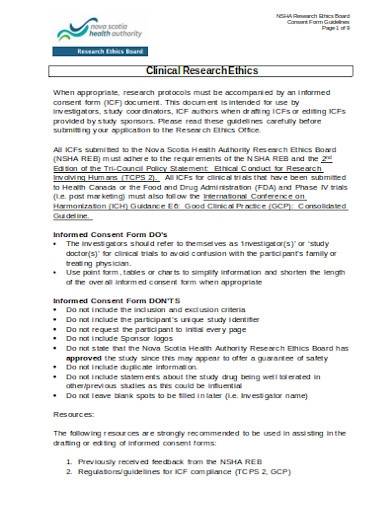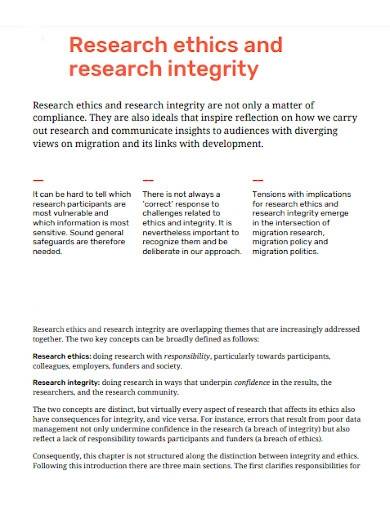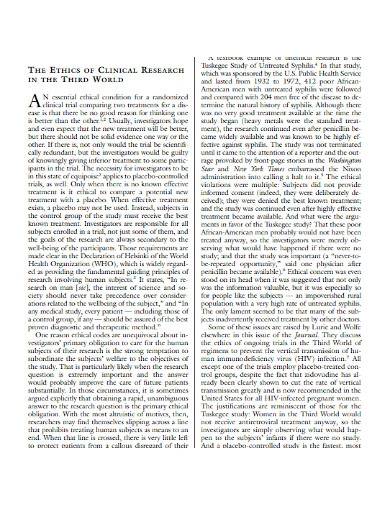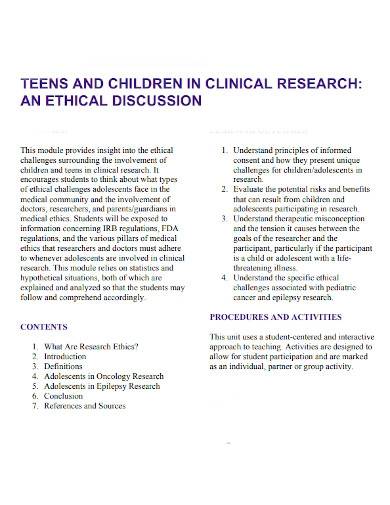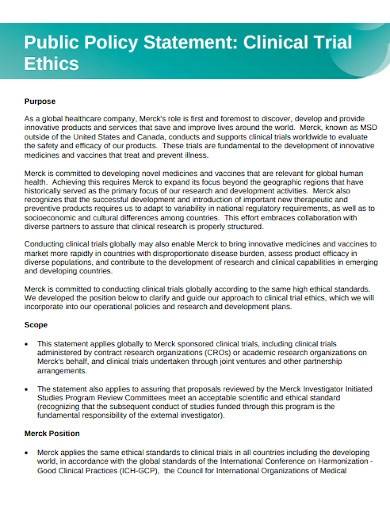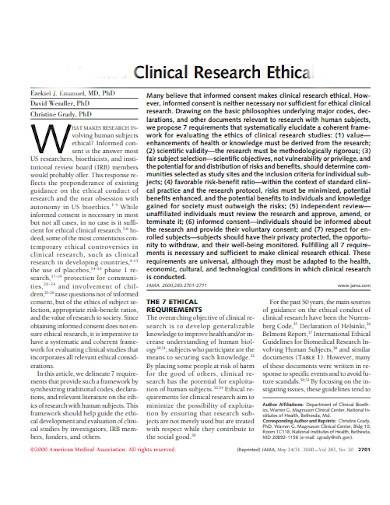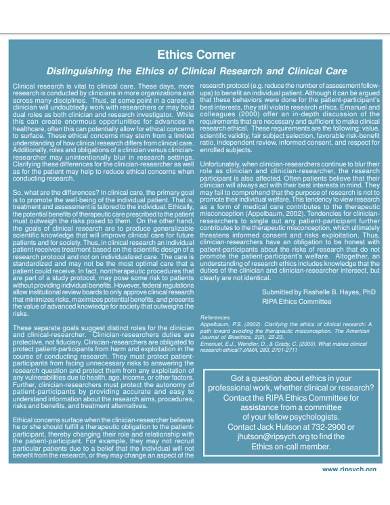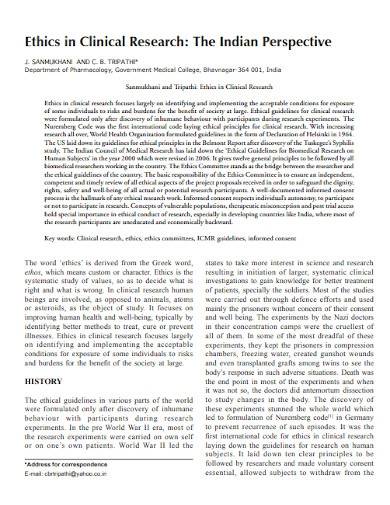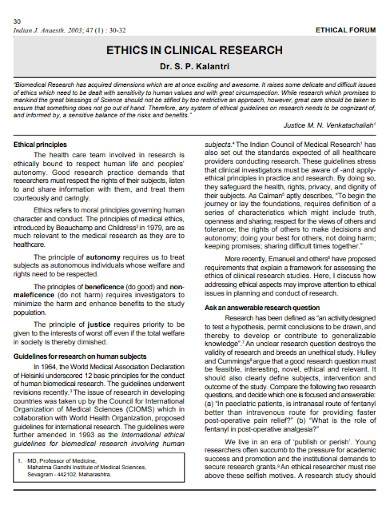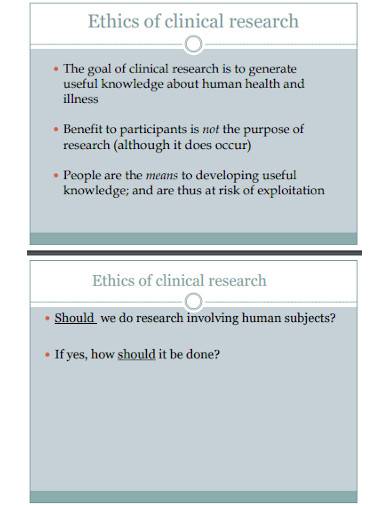The importance of clinical research ethics samples cannot be overstated. Clinical research proposal plays a crucial role in advancing medical knowledge and improving patient care plan. However, research studies involving human participants also carry risks, and it is essential to ensure that these risks are minimized, and participants are protected from harm. Without ethical guidelines and standards, research studies could potentially harm participants, damage public trust in medical research, and hinder scientific research statement.
FREE 10+ Clinical Research Ethics Samples & Templates
1. Clinical Research Ethics Template
2. Clinical Research Ethics Sample
3. Research Ethics and Research Integrity
4. Ethics of Clinical Research
5. Ethical Discussion of Clinical Research
6. Clinical Research Ethics Statement
7. Basic Clinical Research Ethics
8. Clinical Care Research Ethics
9. Ethics in Clinical Research
10. General Clinical Research Ethics
11. Framework for Ethics of Research
What is Clinical Research?
Clinical research ethics refers to the principles and guidelines that govern the ethical conduct of research studies involving human participants. The professional goal of clinical research ethics is to protect the rights and well-being of human participants and ensure that research is conducted in a fair and ethical manner. This essay will discuss the importance of clinical research ethics, the principles that guide ethical research, and the challenges facing researchers in maintaining ethical standards.
How To Make Clinical Research?
The principles that guide ethical research include respect for persons, beneficence, and justice. Respect for persons involves treating participants with dignity and ensuring that they are fully informed about the study and their rights as participants. Beneficence requires that researchers minimize the risks of harm to participants and maximize the potential benefits of the study. To ensure that clinical research is conducted in an ethical manner, researchers must follow established ethical principles and guidelines. The following are some steps that can help ensure that clinical research is conducted in an ethical and responsible manner:
Step 1- Informed Consent
Informed consent is a crucial component of ethical clinical research. Researchers must ensure that participants fully understand the nature of the study, the risks and benefits involved, and their rights as participants before they agree to participate. Informed consent should be obtained in a language that the participant understands and in a manner that is appropriate for the participant’s level of education and understanding.
Step 2- Participant’s Confidentiality
Researchers must take steps to protect participants’ privacy and confidentiality. This includes ensuring that personal information is kept confidential and that participants are not identified in any published reports without their consent. Researchers must take steps to minimize the risks of harm to participants. This includes ensuring that the study is designed in a way that minimizes potential risks and that participants are monitored throughout the study to ensure their safety.
Step 3- Fairness
Researchers must ensure that participants are selected in a fair and unbiased manner. This includes avoiding the exclusion of certain groups of people without a valid reason. Researchers must ensure that the benefits and burdens of the study are distributed fairly. This includes ensuring that vulnerable populations are not exploited and that the benefits of the study are not disproportionately enjoyed by certain groups of people.
Step 4- Ethical Guidelines
Researchers should follow established ethical guidelines, such as those provided by the World Health Organization or the International Council for Harmonisation of Technical Requirements for Pharmaceuticals for Human Use. These guidelines provide a framework for ethical decision-making in clinical research.
What are the principles that guide ethical research?
The principles that guide ethical research include respect for persons, beneficence, and justice. Respect for persons involves treating participants with dignity and ensuring that they are fully informed about the study and their rights as participants. Beneficence requires that researchers minimize the risks of harm to participants and maximize the potential benefits of the study. Finally, justice requires that the benefits and burdens of research be distributed fairly, and that vulnerable populations are not exploited.
What are some of the challenges facing researchers in maintaining ethical standards in clinical research?
Maintaining ethical standards in clinical research can be challenging. One of the biggest challenges is obtaining informed consent from participants. Informed consent is crucial for protecting participants’ autonomy and ensuring that they understand the risks and benefits of the study. Additionally, researchers must balance the potential benefits of research with the risks to participants, ensure that the potential benefits of the study are distributed fairly, and protect participants’ privacy and confidentiality.
How can researchers ensure that clinical research is conducted in an ethical and responsible manner?
Researchers can ensure that clinical research is conducted in an ethical and responsible manner by following established ethical principles and guidelines, obtaining informed consent from participants, protecting participants’ privacy and confidentiality, minimizing risks to participants, ensuring fairness in participant selection, ensuring fair distribution of benefits and burdens, and obtaining institutional review board (IRB) approval.
Related Posts
FREE 59+ Sample Letter of Intent in MS Word PDF
Sample Product Evaluation Form
FREE 4+ IT PowerPoint Templates in PPT
FREE 8+ Sample Scientific Reports in PDF MS Word | Google Docs
FREE 10+ Sample Case Report Templates in PDF MS Word ...
Sample Psychological Report
FREE 11+ Clinical Audit Report Templates in PDF MS Word
FREE 44+ Sample Checklist Samples & Templates in Samples in ...
FREE 4+ Data Analyst Cover Letter Templates in MS Word PDF
FREE 12+ Sample Research Reports in MS Word Apple Pages ...
FREE 9+ Sample Social Work Cover Letter Templates in MS Word
FREE 8+ Sample Child Medical Consent Forms in MS Word PDF
FREE 15+ Sample Evaluation Reports in PDF MS Word | Apple ...
FREE 8+ Product Monograph Samples in PDF MS Word
FREE 58+ Letter of Intent in PDF MS Word | Pages | Google Docs

